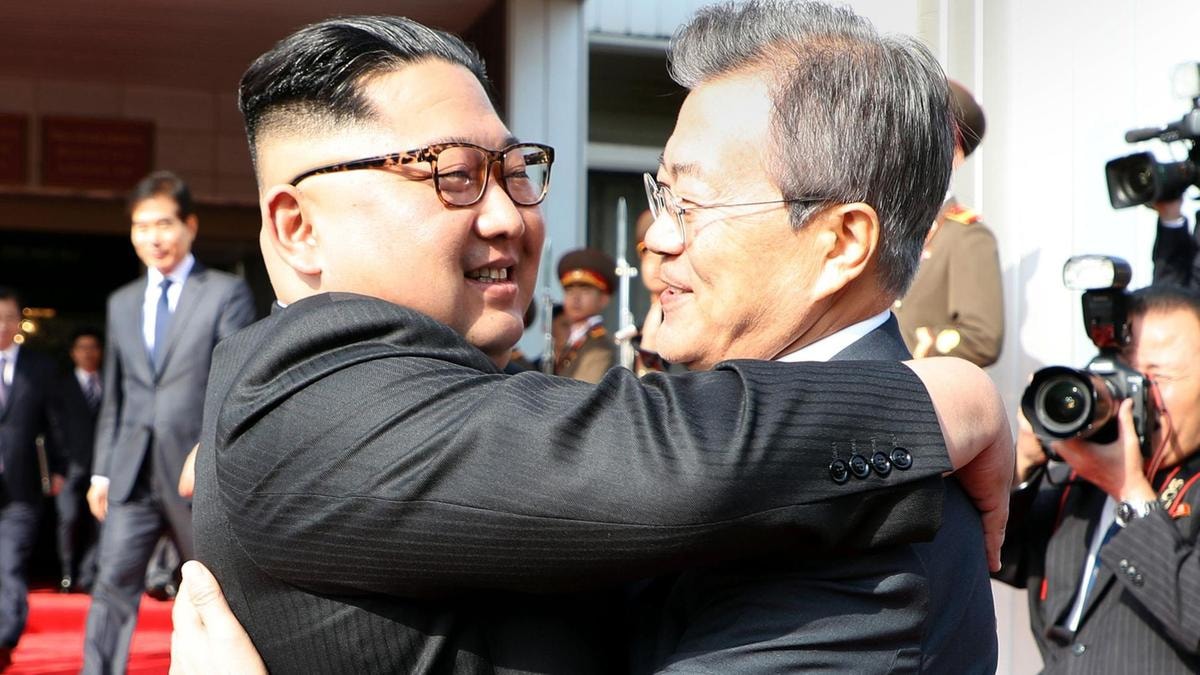Profound insights into the US-North Korea summit
(Baonghean.vn) - Events on the Korean peninsula have undergone rapid changes in recent days, especially changes related to the first US-North Korea summit between President Donald Trump and leader Kim Jong-un, which was scheduled to take place in Singapore on June 12.
| What does the international community expect from the US-North Korea summit? Photo: Getty |
Just a few months ago, the two leaders of the US and North Korea were constantly engaged in a war of words with insults and threats against each other. This attitude eased during the 2018 Pyeongchang Olympics until mid-March when the two sides agreed to conduct direct dialogue. After many negotiations, the schedule for the US-North Korea summit was set to take place in Singapore on June 12.
However, this May, Pyongyang and Washington have again raised mutual suspicions about this meeting. Insults flared again when a North Korean deputy foreign minister called US Vice President Mike Pence a "moron" and then both sides threatened to cancel the meeting.
After sending a letter to Mr. Kim Jong-un, officially announcing the "cancellation" of the planned meeting, Mr. Trump suddenly announced that "the meeting is likely to still take place as planned" exactly one day after Pyongyang's "calming" statements.
Mr. Cho Sung-ryul, a senior researcher at the Institute for National Security Strategy (INSS), said: "Mr. Trump's unexpected reaction (refusing to hold a US-North Korea summit) surprised Mr. Kim Jong-un and forced the Pyongyang government to find a way to mend the relationship."
Others believe the crisis is largely linked to Kim Jong-un and South Korean President Moon Jae-in, who made the groundbreaking decision to hold the fourth inter-Korean summit at the truce village of Panmunjom on May 26.
The US State Department said another group of Washington officials also met with Pyongyang officials at the Panmunjom truce village on May 27.
According to the Washington Post, senior diplomat Sung Kim led the US delegation to hold talks with North Korean officials in Panmimjom on both May 28 and 29.
At the same time, another group of US officials was also en route to Singapore to coordinate with North Korea to prepare logistics for the upcoming summit, the White House said.
Who is Mr. Sung Kim?
Few senior US officials have as much experience negotiating with North Korea as Sung Kim. The Korean-born diplomat served as US ambassador to Seoul and as US Special Envoy and Head of the Six-Party Talks in the 2000s.
He is currently the US Ambassador to the Philippines but was recalled by the Donald Trump administration to take on the job that is his forte (negotiating with North Korea). However, Mr. Trump has not yet considered nominating him as ambassador to South Korea as previously speculated.
What will happen?
Given the ups and downs of the issue and the fluid nature of the parties involved, few observers in South Korea can make definitive judgments. However, most observers believe that the process of resolving the nuclear issue on the Korean Peninsula is back on track.
In the past 48 hours, Mr. Donald Trump has been very optimistic when saying that the US-North Korea summit will take place as planned in Singapore on June 12 or can take place at a later time if both sides need more time.
In reality, these types of meetings are often planned and prepared by the parties for months, even years.
Up to now, US and North Korean officials only have about two weeks to prepare for the meeting with detailed protocol such as where the meeting will take place in Singapore and how UN sanctions will affect the officials participating in the delegation accompanying Mr. Kim Jong-un to Singapore...
Most importantly, they will have to decide what the two US and North Korean leaders will say at their upcoming meeting.
 |
| North Korean leader Kim Jong-un and South Korean President Moon Jae-in made a groundbreaking decision to hold the fourth inter-Korean summit at the truce village of Panmunjom. Photo: AP |
What are the barriers?
If it were a word, it would be “denuclearization.” Both the US and North Korea say they want that, but they differ on how to define the concept.
Washington wants to see complete, irreversible and verifiable denuclearization (CVID) in return for the international community lifting sanctions and providing economic aid to North Korea.
Mr Trump wants CVID to be implemented immediately, although he recently admitted that the way it will be carried out could be discussed further.
For his part, South Korean President Moon Jae-in affirmed that Mr. Kim Jong-un is committed to complete denuclearization of the Korean peninsula.
However, when asked if that was similar to the CVID request made by Mr. Trump, Mr. Moon Jae-in emphasized to reporters that "it is an issue that Washington and Pyongyang need to discuss."
Analysts believe that North Korea is completely unwilling to give up its nuclear weapons unless it receives security guarantees that the United States will not seek to overthrow the current ruling regime in Pyongyang.
This means North Korea is waiting for US confidence-building measures such as reducing the number of troops stationed in South Korea or stopping annual US-South Korea military exercises.
Kim Sung-han, a professor of international relations at Korea University, said that Trump would have difficulty accepting any conditions from North Korea because he has already faced criticism over the Iran nuclear deal.
Professor Kim emphasized: "If he thinks it is difficult to implement CVID or difficult to come up with any specific time to force North Korea to quickly denuclearize, it is very likely that he will cancel the summit again, even in the final days"./.

